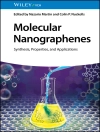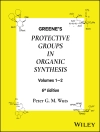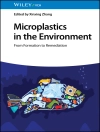The theory, methods, and practices needed to build molecules
and supramolecular systems
Using a synthetic approach to organic materials chemistry, this
book sets forth tested and proven methods and practices that make
it possible to engineer organic molecules offering special
properties and functions. Throughout the book, plenty of real-world
examples demonstrate the countless possibilities of creating
one-of-a-kind molecules and supramolecular systems to support a
broad range of applications. The book explores applications in both
materials and bioorganic chemistry, including molecular
electronics, energy storage, sensors, nanomedicine, and enzyme
engineering.
Organic Synthesis and Molecular Engineering consists of
fourteen chapters, each one contributed by one or more leading
international experts in the field. The contributions are based on
a thorough review and analysis of the current literature as well as
the authors’ firsthand experience in the lab engineering new
organic molecules. Designed as a practical lab reference, the book
offers:
* Tested and proven synthetic approaches to organic materials
chemistry
* Methods and practices to successfully engineer functionality
into organic molecules
* Explanations of the principles and concepts underlying
self-assembly and supramolecular chemistry
* Guidance in selecting appropriate structural units used in the
design and synthesis of functional molecules and materials
* Coverage of the full range of applications in materials and
bioorganic chemistry
* A full chapter on graphene, a new topic generating intense
research
Organic Synthesis and Molecular Engineering begins with
core concepts, molecular building blocks, and synthetic tools.
Next, it explores molecular electronics, supramolecular chemistry
and self-assembly, graphene, and photoresponsive materials
engineering. In short, it offers everything researchers need to
fully grasp the underlying theory and then build new molecules and
supramolecular systems.
Зміст
Acknowledgements vii
Contributors ix
1 Introduction 1
Mogens Brøndsted Nielsen
2 Organic Building Blocks for Molecular Engineering 4
Kasper Lincke and Mogens Brøndsted Nielsen
3 Design and Synthesis of Organic Molecules for Molecular
Electronics 46
Karsten Jennum and Mogens Brøndsted Nielsen
4 Carbon Nanotubes and Graphene 76
Helena Grennberg
5 H-Bond Based Nanostructuration of Supramolecular Organic
Materials 128
Tomas Marangoni and Davide Bonifazi
6 Molecular Systems for Solar Thermal Energy Storage and
Conversion 179
Kasper Moth-Poulsen
7 Strategies to Switch Fluorescence with Photochromic Oxazines
197
Erhan Deniz, Janet Cusido, Massimiliano Tomasulo, Mutlu Battal,
Ibrahim Yildiz, Marco Petriella, Mariano L. Bossi, Salvatore
Sortino, and Françisco M. Raymo
8 Supramolecular Redox Transduction: Macrocyclic Receptors for
Organic Guests 213
Sébastien Goeb, David Canevet, and Marc Sallé
9 Detection of Nitroaromatic Explosives Using
TTF-Calix[4]pyrroles 257
Karina R. Larsen, Kent A. Nielsen, Jonathan L. Sessler, and Jan
O. Jeppesen
10 Recognition of Carbohydrates 284
Martina Cacciarini
11 Cyclodextrin Based Artificial Enzymes: Synthesis and Function
305
Christian Marcus Pedersen and Mikael Bols
12 Organozymes: Molecular Engineering and Combinatorial
Selection of Peptidic Organo and Transition Metal Catalysts
333
Morten Meldal
13 Dendrimers in Biology and Nanomedicine 361
Jørn Bolstad Christensen
14 Dynamic Combinatorial Chemistry 393
Brian Rasmussen, Anne Sørensen, Sophie R. Beeren, and
Michael Pittelkow
Index 437
Про автора
MOGENS BRØNDSTED NIELSEN, Ph D, is Professor of
Organic Chemistry at the University of Copenhagen, where he teaches
courses in advanced organic chemistry, heterocyclic chemistry, and
supramolecular chemistry. Dr. Nielsen has published more than 100
peer-reviewed papers, monographs, and book chapters.












